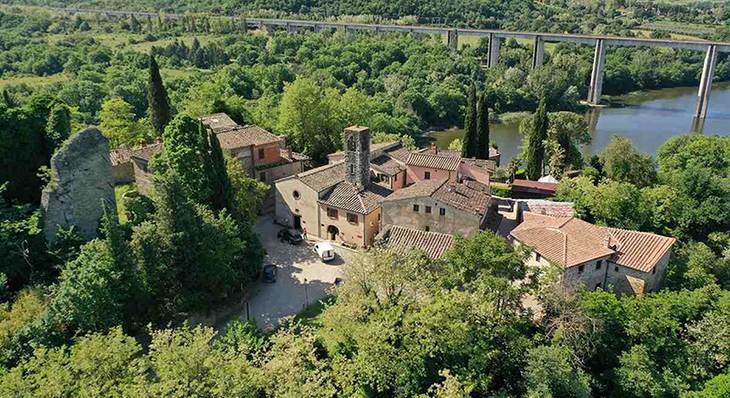
In Italy, a groundbreaking institution, the Swallow Citadel of Peace, is fostering a unique environment where Palestinians and Israelis, Americans with Tribal origins and those with European roots, Bosnian Muslims and Orthodox Serbs coexist harmoniously, united by a shared commitment to becoming agents of interfaith peace. Nestled in the picturesque hills of Tuscany near the city of Arezzo within a medieval campus, this institution offers a diverse range of higher education programs and degrees, each with a transformative stipulation.
The distinctive feature of this educational haven is its requirement for prospective students to reside with individuals from their perceived “enemy” group—be it within their domestic ethnic community or among neighbors from a historically conflicting nation. The rationale behind this unorthodox approach is rooted in the institution’s mission to unravel the complex layers of animosity and discord, compelling students to confront the deep-seated reasons behind their mutual antipathy. By immersing themselves in a shared living experience, the students are guided through a process of deconstructing prejudices, breaking the spell of perceiving others as the “other,” and ultimately, returning to their respective nations as catalysts for peace.
In an era marked by pervasive ethnic conflicts worldwide, where generations have been shaped by the seeds of discord sown several generations prior, the Swallow Citadel of Peace emerges as an unparalleled force for positive change. Its mission transcends conventional education by actively engaging with the roots of hatred and strife, aiming to cultivate a new generation of leaders capable of forging pathways to reconciliation and understanding on a global scale. In the midst of a tumultuous world, this institution stands as a beacon of hope, challenging the status quo and offering a transformative educational paradigm that addresses the urgent need for interfaith harmony and cooperative coexistence.
“We didn’t want to build a Utopian place where students could pretend war doesn’t exist,” Franco Vaccari elaborated. He is the co-founder and president of Rondine. “We wanted, rather, to create a neutral ground, away from the chaos of their homelands and bigger Western cities, where our students could focus on a peaceful dialogue.”
Rondine, meaning “swallow” in Italian, is an educational institution that provides diverse academic programs, including a master’s program in conflict management and humanitarian action. Upon enrollment, students undergo an intensive Italian language course before delving into subjects such as interfaith dialogue, methodological approaches, and leadership skills aimed at dismantling the concept of an “enemy” and promoting reconciliation.
As part of the scholarship requirement, students like Ruzica Markovic, a Bosnian Croat born in the aftermath of the Balkans War, complete their academic journey and return to their countries of origin. There, they are tasked with spearheading a one-year peacebuilding and reconciliation program. Ruzica, for instance, shared her experiences with the Christian Science Monitor, highlighting her efforts in organizing interfaith cafe events, conferences, and summer camps dedicated to fostering reconciliation in the region.
The unique curriculum at Rondine equips students with not only academic knowledge but also practical skills and a deep understanding of the complexities of conflict resolution. By immersing themselves in the study of Italian, interfaith dialogue, and leadership, students like Ruzica emerge as agents of positive change, committed to addressing the aftermath of conflicts in their home countries.
Ruzica’s story exemplifies the impact of Rondine’s educational approach, demonstrating how graduates can actively contribute to peacebuilding initiatives. The commitment to return to their communities and implement reconciliation programs underscores the institution’s broader mission of nurturing individuals who can lead transformative efforts in regions scarred by conflict.
“I learned to see the other person as myself: a being with emotions, challenges, pain, frustrations, maybe some traumas. That’s the lesson I brought back home,” Ms. Markovic told CSM in a video call that came from Sarajevo.
Navigating through the intricacies of the mission becomes apparent as one strolls through the medieval castle that constitutes the Rondine campus. The setting, adorned with gnarled oaks and the allure of Tuscan cuisine, creates an environment where the unexpected unfolds. Educators at the Citadel of Peace reveal that, amidst this picturesque backdrop, news occasionally flickers to life, sparking debates that echo sentiments dormant for months.
Yet, within this challenging milieu, the Rondine campus offers a tapestry of opportunities—shared study sessions, communal dormitories, and spirited sporting events—all converging to underscore a fundamental truth. Despite the diverse backgrounds and historical complexities that students bring with them, they are fundamentally human, not adversaries.
As the new academic year dawns, the student body is set to include Armenians and Azerbaijanis, their presence mirroring the ongoing tensions in the disputed territory of Artsakh-Nagorno-Karabakh. The shadows of recent events, including the latter’s seizure and allegations of ethnic cleansing, add a layer of complexity to the dynamic.
Similarly, Russians and Ukrainians join the cohort, their inclusion coinciding with the aftermath of the former’s triumph over the latter in the Donbas and Kherson. The geopolitical reverberations are palpable, casting a unique light on the interactions within the castle walls.
Moreover, the student body extends its embrace to Canadians and Americans, representing both tribal and European origins. Palestinians and Israelis, encapsulating a history marked by conflict, find themselves side by side in pursuit of education. The Rondine campus, with its diverse enrollment, becomes a microcosm of the world’s complexities, challenging preconceived notions and fostering an environment where understanding transcends geopolitical divides.
What are your thoughts? Please comment below and share this news!
True Activist / Report a typo


